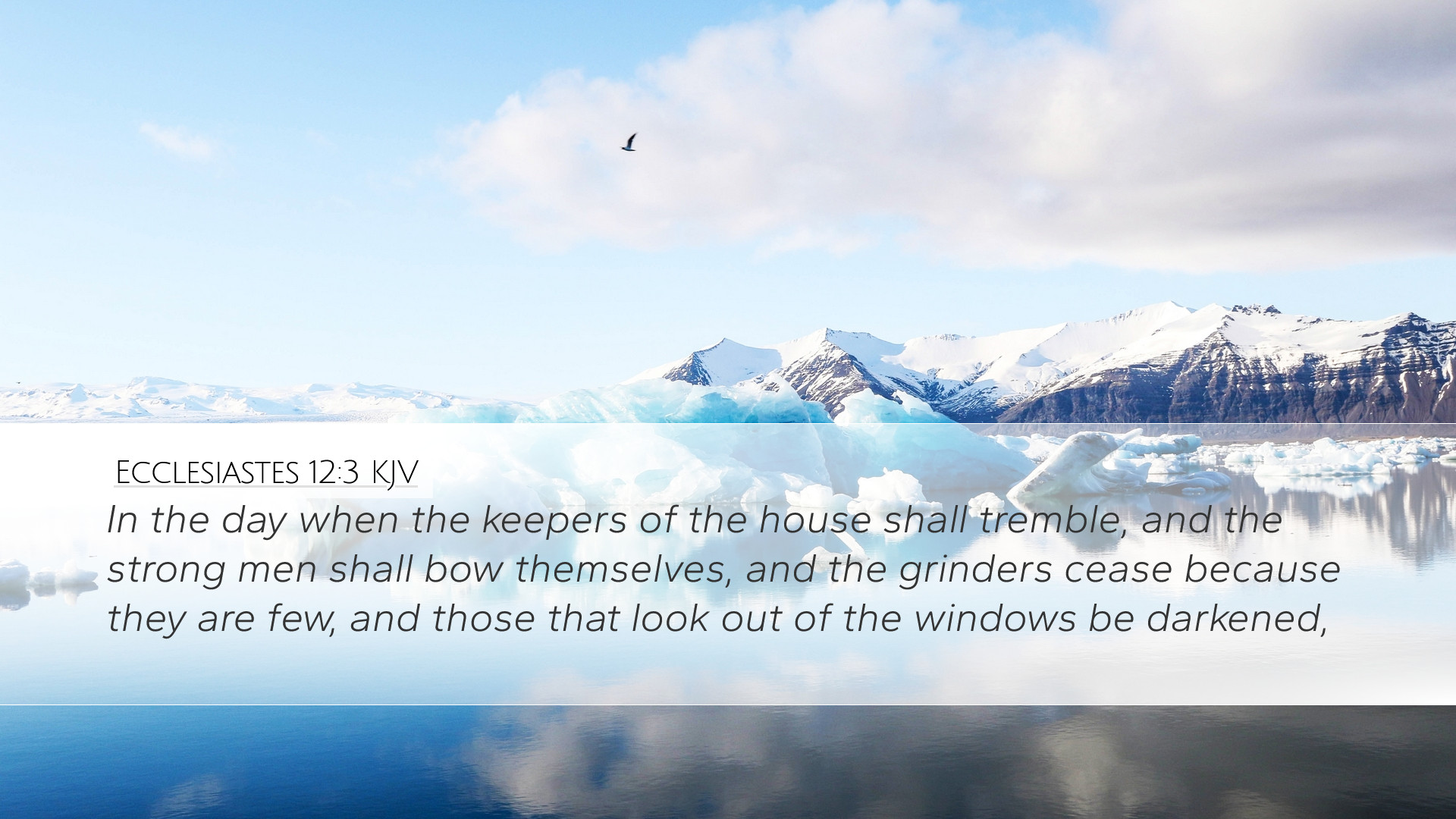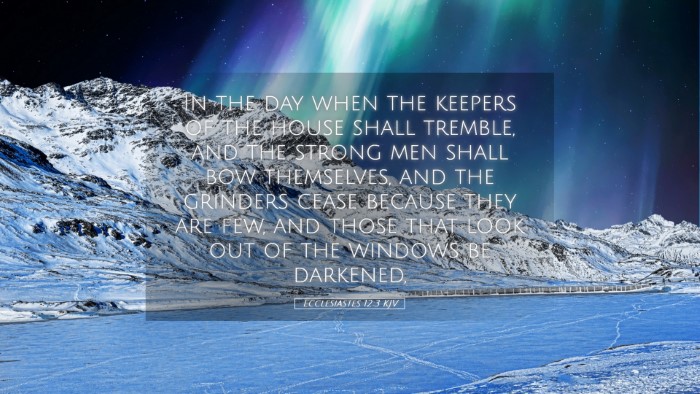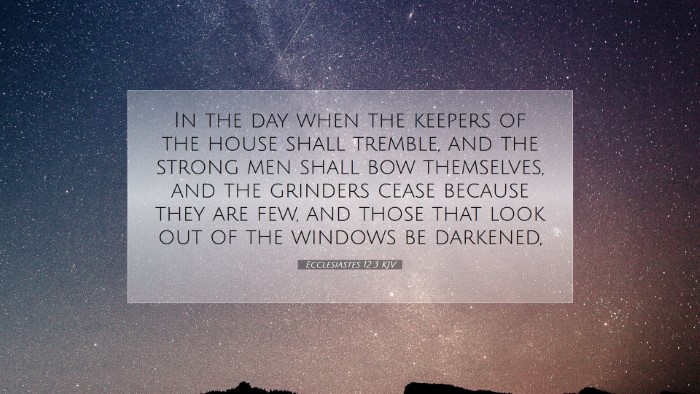Old Testament
Genesis Exodus Leviticus Numbers Deuteronomy Joshua Judges Ruth 1 Samuel 2 Samuel 1 Kings 2 Kings 1 Chronicles 2 Chronicles Ezra Nehemiah Esther Job Psalms Proverbs Ecclesiastes Song of Solomon Isaiah Jeremiah Lamentations Ezekiel Daniel Hosea Joel Amos Obadiah Jonah Micah Nahum Habakkuk Zephaniah Haggai Zechariah MalachiEcclesiastes 12:3
Ecclesiastes 12:3 KJV
In the day when the keepers of the house shall tremble, and the strong men shall bow themselves, and the grinders cease because they are few, and those that look out of the windows be darkened,
Ecclesiastes 12:3 Bible Commentary
Commentary on Ecclesiastes 12:3
Ecclesiastes 12:3 (ESV): "In the day when the keepers of the house tremble, and the strong men are bent, and the grinders cease because they are few, and those who look through the windows are dimmed."
The concluding chapters of Ecclesiastes are loaded with profound reflections on the fragility of life as it progresses towards old age and inevitable death. In this verse, the Preacher (traditionally attributed to Solomon) uses vivid imagery to convey the reality of aging and its consequences.
Examination of Key Phrases
1. "When the keepers of the house tremble"
Matthew Henry notes that the "keepers of the house" may refer metaphorically to the arms or hands, which tremble with age. This tremor symbolizes vulnerability and the decline of physical strength.
Albert Barnes elaborates that the house represents the human body as a whole, with each part symbolizing a specific function or capacity that deteriorates with time.
2. "The strong men are bent"
This phrase highlights the loss of physical prowess and vigor. Adam Clarke emphasizes that this reflects not only a physical bending but a metaphorical one, representing the weakening of resolve and the energy of youth.
3. "The grinders cease because they are few"
This refers to the teeth, indicating their decay and loss. Matthew Henry points out this imagery signifies the decrease in one's ability to enjoy the richness of life, especially in consuming food, which is often a source of pleasure. The less one can enjoy, the less is their vitality.
4. "Those who look through the windows are dimmed"
The "windows" metaphor likely signifies the eyes. Albert Barnes interprets this dimming as representing the loss of clarity in perception and understanding, both literally in vision and figuratively in one's ability to see life with clarity and insight as one ages.
Theological Reflections
Transition from Youth to Old Age
The progression from youth to old age is a fundamental theme in Biblical literature. Matthew Henry articulates that this verse serves as a stark reminder of life's temporality and the changes one undergoes as time passes. The Preacher invites the reader to ponder on the importance of utilizing their youth wisely while fostering spiritual wisdom and understanding.
Call to Remember the Creator
In its broader context, Ecclesiastes 12 serves as a precursor to the final exhortation: to remember the Creator in the days of youth before the days of trouble come (Ecclesiastes 12:1). Adam Clarke asserts that this recalls the necessity of a relationship with God as a foundation for a productive and fulfilling life, essential not just for the young but as a reminder in times of decline.
Reflections for Pastors and Theologians
This verse offers rich material for sermons and discussions about aging, mortality, and the human condition. Albert Barnes encourages pastors to consider how aging can be feared, yet it also invites wisdom and perspective often unattainable in youth. This creates opportunities to demonstrate God's faithfulness through each stage of life.
Practical Application
- Encouraging Elderly Congregants: Pastors can use this verse to uplift and encourage members of the congregation who may feel fear or sorrow over their aging bodies. Reminding them of their value and contributions to the community can foster a nourishing church environment.
- Life Stages in Ministry: Understanding the different phases of life challenges pastors to address issues pertinent to the young, middle-aged, and elderly segments of their flocks. Each group grapples with unique concerns highlighted by this verse.
- Education and Discipleship: By drawing upon the imagery in this verse, educators can develop classes, discussions, and sermons that focus on living wisely in the fleetingness of life, calling congregations to engage with their faith more deeply.
Conclusion
Ecclesiastes 12:3 provides a somber yet constructive perspective on aging and mortality. Through the combined insights of Matthew Henry, Albert Barnes, and Adam Clarke, this commentary illustrates a multifaceted understanding of physical and spiritual decline. As believers reflect on this verse, they are invited to confront the realities of life bravely, dedicate themselves to spiritual preparation, and embrace the wisdom that can only be gained through the passage of time.
Ultimately, Ecclesiastes encourages us to seize each moment, treasure our relationships, and cultivate a deep relationship with our Creator, emphasizing that life's brevity should not lead to despair but instead foster a fuller appreciation of God's grace within our finite existence.


